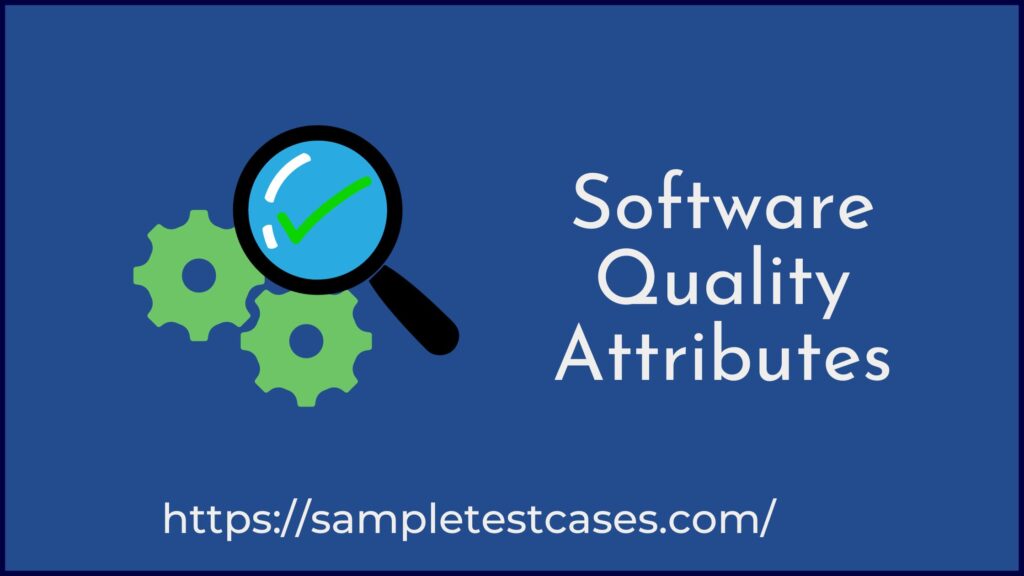In this article, we will explore some of the most important software quality attributes, why they matter, and how they impact both developers and end-users. When we use software applications, we expect them to perform well, be reliable, and provide a satisfying user experience. Software quality attributes in software engineering are the characteristics or dimensions that define the overall quality of software. These attributes play a crucial role in determining how successful and dependable software applications are.
What is Software Quality Attributes?
Software quality attributes, also known as software quality characteristics or software quality factors, are the measurable and observable properties of software that determine its overall quality. These attributes are essential in evaluating and ensuring that software meets user expectations, functions correctly, and delivers a satisfactory user experience. Software quality attributes encompass a wide range of characteristics that influence the effectiveness, reliability, performance, and usability of software applications. Here are some key software quality attributes.
Software Quality Attributes
1. Functionality
Functionality is one of the most fundamental software quality attributes. It refers to the ability of software to perform its intended tasks and functions accurately and efficiently. In essence, software must do what it’s designed to do. If it’s a word processing application, it should handle text editing, formatting, and printing effectively.
Why it matters: Functionality is the primary reason for using software. Poor functionality can lead to user frustration and dissatisfaction.
2. Reliability
Reliability relates to the software’s ability to perform consistently and predictably under various conditions without failures or crashes. Reliable software should operate without unexpected errors or system crashes.
Why it matters: Unreliable software can result in data loss, system downtime, and damage to an organization’s reputation.
3. Usability
Usability refers to how user-friendly and accessible the software is. It involves aspects like intuitive interfaces, clear navigation, and an overall pleasant user experience. Usability is crucial in ensuring that users can effectively use the software without confusion.
Why it matters: Usability impacts user satisfaction, adoption rates, and the overall success of software products.
4. Performance
Performance is the ability of software to execute tasks efficiently and respond promptly to user inputs. It encompasses factors such as speed, responsiveness, and resource utilization. High-performance software should provide quick results even under heavy loads.
Why it matters: Slow or resource-intensive software can frustrate users and lead to productivity losses.
5. Scalability
Scalability refers to the software’s capability to handle increasing workloads, users, or data volumes without a significant decrease in performance. Scalable software can accommodate growth without major disruptions.
Why it matters: Scalability is vital for applications that expect to see increased usage over time, preventing bottlenecks and downtime.
6. Security
Security is the protection of software and data from unauthorized access, breaches, and vulnerabilities. Secure software should have measures in place to defend against threats and keep sensitive information safe.
Why it matters: Security breaches can result in data leaks, legal issues, and damage to an organization’s reputation.
7. Maintainability
Maintainability is the ease with which software can be modified, updated, or repaired. Maintainable software is designed with clean code, proper documentation, and modular components, making it simpler for developers to work with.
Why it matters: Maintainability reduces the cost and effort required for ongoing software maintenance and updates.
8. Portability
Portability refers to the software’s ability to run on various platforms, operating systems, or environments without modification. Portable software can be easily adapted to different environments.
Why it matters: Portability allows software to reach a wider audience and be flexible in its deployment.
9. Compliance
Compliance relates to adherence to industry standards, regulations, and best practices. Compliant software ensures that it meets legal requirements and industry-specific standards.
Why it matters: Non-compliance can result in legal issues, financial penalties, and restrictions on software use.
10. Availability
Availability is the measure of how often the software is accessible and operational. Highly available software should have minimal downtime and be accessible when users need it.
Why it matters: Downtime can disrupt business operations and inconvenience users.
Conclusion
Achieving an optimal balance of these software quality attributes is essential for creating successful software applications. Depending on the application’s purpose and the needs of its users, different attributes may take precedence. A software product that excels in these attributes is more likely to gain user trust, enhance user satisfaction, and contribute positively to an organization’s goals and reputation.
